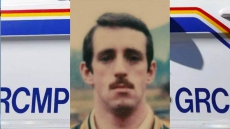VANCOUVER — A British Columbia Supreme Court judge is tasked with deciding how much the public should be allowed to know about the involvement of Canada's spy agency in a terrorism probe.
Justice Catherine Bruce will consider if transcripts should be released to the media of a closed-door hearing into the role of an alleged Canadian Security Intelligence Service operative linked to the case of John Nuttall and Amanda Korody.
They were found guilty by a jury last June of conspiracy to commit murder and possessing explosives for the benefit of a terrorist organization.
The conviction has been put on hold while defence lawyers argue that police manipulated the pair into planting what they believed were bombs on the grounds of the B.C. legislature on Canada Day 2013.
Lawyer Daniel Burnett appeared before the judge on Thursday on behalf of The Canadian Press and other media outlets to argue against the proceedings being held in secret on Monday.
"An in-camera order is the most extreme secrecy tool the court has, only to be exercised in the most compelling cases, only for the narrowest of proceedings, and only for the shortest time possible," Burnett told the court.
"It's difficult to imagine that everything would be justified as remaining entirely in camera," he added, suggesting a narrower order be used, such as a specific ban on publication.
Crown lawyer Sharon Steele objected to lifting the in-camera order, arguing that nearly everything discussed in Monday's closed-door proceedings would risk identifying the alleged CSIS operative.
"Anyone who's been in the (courtroom's public) gallery for any length of time in this proceeding could readily identify who's being talked about based on the information that was provided at the (in-camera) hearing," Steele said.
"Mr. X was referred to specifically by his name."
Department of Justice lawyer Helen Park echoed Steele's concerns, arguing that a simple publication ban on this individual's identity would be insufficient to protect the man and his family.
"While the decision to proceed in camera limits the freedom of expression and the freedom of the press, we submit that those rights have to be balanced against this person's individual privacy and safety interests," Park said.
She added that if Bruce agreed to release the transcripts, that CSIS be permitted to redact any sensitive information.
"That's unusual for CSIS to get an opportunity to edit the transcript," said Bruce, noting she's never heard of such a thing and that the court is normally responsible for redactions.
"Maybe we'd all have a hand in editing," Park replied. "We thought that we'd do the first cut."
Earlier in the day the court heard from the RCMP commander of the undercover sting, who said he advised his team to be wary of Korody becoming suspicious of the covert operation during its initial focus on Nuttall.
"I found that in other previous operations the wives of targets are actually a lot more switched on than the actual targets themselves," said Sgt. Bill Kalkat.
Proceedings are scheduled to continue until mid-February.



